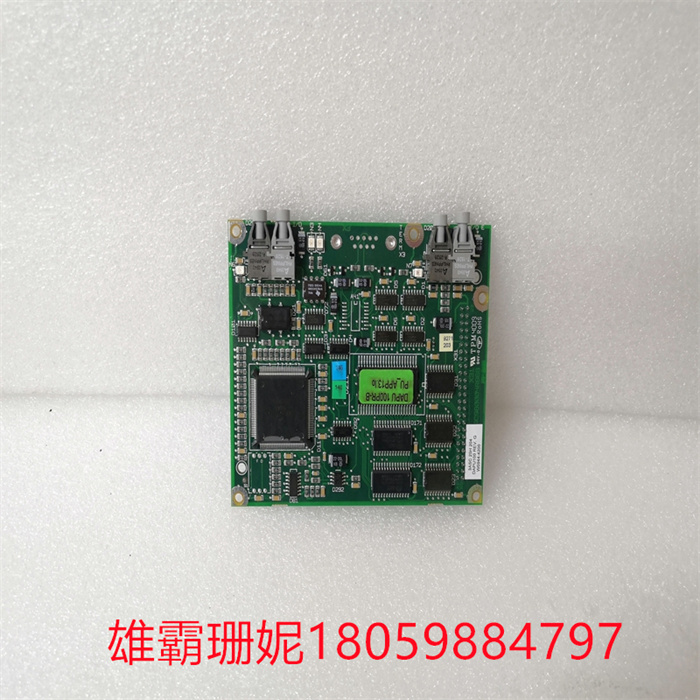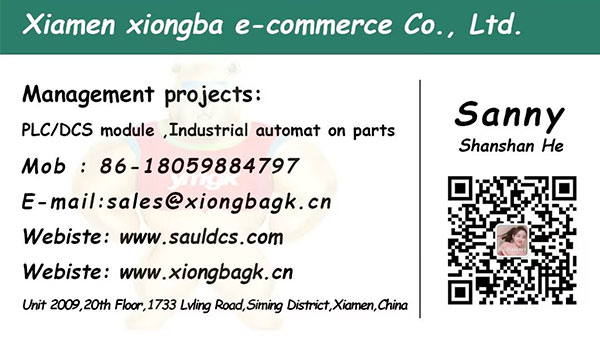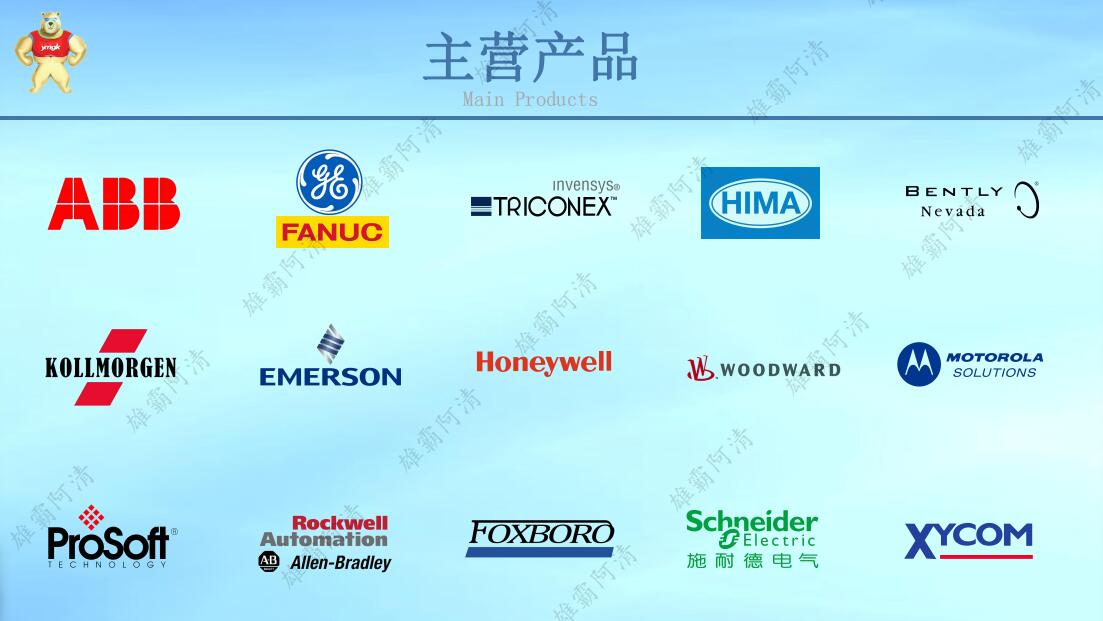3ASC25H204 DAPU100 ABB 输出模块数字

可编程逻辑控制器或 PLC 在当今的各种流程和制造行业中无处不在。PLC 最初旨在取代机电继电器系统,以便为修改控制系统的操作提供更简单的解决方案。无需重新连接大量继电器,只需从 PC 或编程设备快速下载,即可在几秒钟内更改控制逻辑。PLC 是一种工业级数字计算机,旨在执行控制功能,尤其适用于工业应用。
今天的大多数 PLC 都是模块化的,允许用户添加各种功能,包括离散和模拟输入和输出、PID 控制、位置控制、电机控制、串行通信和高速网络。与继电器组等较旧的技术相比,PLC 更易于故障排除和维护、更可靠、更具成本效益且用途更广泛。Modicon 是“模块化数字控制器”的缩写,它既是1968 年发明的第一个 PLC 产品的名称,也是发明它的品牌,尽管现在归施耐德电气所有。
虽然它可能看起来不像典型的家用计算机,但 PLC 的核心与大多数人在日常生活中使用的计算机和智能设备中所见的技术完全相同。
基本组件PLC由几个基本部分组成。它们可能看起来与各个制造商略有不同,但每个组件的用途和范围是相同的。其中包括电源、中央处理单元 (CPU)、输入/输出卡以及放置输入/输出 (I/O) 卡的背板或机架。如图 2 所示,背板在所有独立组件之间建立了电气连接,从而为 PLC 提供了模块化设计。这种电连接包括电源和通信信号。许多 PLC 制造商在背板上使用专有通信协议,以便 I/O 可以安全地与 CPU 通信。电源根据应用和安装环境,电源可接受 120VAC 或 24VDC。如上所述,此电压通过背板为 CPU 和 I/O 模块提供电源,这些模块以“卡”的形式出现。这些卡可以从它们在载体中的插槽中快速添加或移除。需要注意的是,CPU 的电源并不为传感器和线圈等现场设备供电。此电源连接必须单独与卡建立。
中央处理器 (CPU)CPU 是 PLC 的实际“大脑”,使其成为计算机。即使是小型的非模块化 PLC 也包含一个 CPU。输入信号来自 I/O 卡,逻辑程序根据信号做出决策。如果需要,CPU 然后命令输出随着信号和条件的变化而打开和关闭。程序可能包括高级功能,例如数学运算、计时、计数和通过现代网络协议共享信息。对于较旧的中继系统,其中许多操作即使不是不可能,也是极其困难的。
输入/输出卡传感器、按钮、开关、继电器、螺线管甚至网络设备与连接到 I/O 卡上的螺丝端子的 I/O 信号共享信息。可以根据每台机器和设施的需要选择这些卡。在一些小型 PLC中,I/O 端子不是模块化卡,而是方便地安装在 PLC 的侧面。由于 I/O 设备结构种类繁多,分立和模拟模块的种类繁多,模拟模型的术语有“源”与“灌”,“电压”与“电流” 。编程设备和人机界面PLC 本身之外有两个非常重要的组件:编程设备和人机界面 (HMI)。编程设备可以是来自同一制造商的台式计算机、膝上型计算机或手持式仪器。一些小型 PLC 甚至在前面有按钮,可以在不需要计算机的情况下对非常基本的逻辑操作进行编程。
3ASC25H204 DAPU100 ABB 输出模块数字

Programmable logic controller or PLC is ubiquitous in today's various processes and manufacturing industries. PLC was originally designed to replace electromechanical relay system in order to provide a simpler solution for modifying the operation of control system. Without reconnecting a large number of relays, you can change the control logic in a few seconds by downloading it quickly from a PC or a programming device. PLC is an industrial digital computer, which aims to perform control functions, especially suitable for industrial applications.
Today, most PLCs are modular, allowing users to add various functions, including discrete and analog input and output, PID control, position control, motor control, serial communication and high-speed network. Compared with older technologies such as relay group, PLC is easier to troubleshoot and maintain, more reliable, more cost-effective and more widely used. Modicon is the abbreviation of "modular digital controller", which is not only the name of the first PLC product invented in 1968, but also the brand that invented it, although it is now owned by Schneider Electric.
Although it may not look like a typical home computer, the core of PLC is exactly the same as the technology that most people see in computers and smart devices used in their daily lives.
The basic component PLC consists of several basic parts. They may look slightly different from each manufacturer, but the purpose and scope of each component are the same. It includes a power supply, a central processing unit (CPU), an input/output card, and a backplane or rack for placing the input/output (I/O) card. As shown in Figure 2, the backplane establishes electrical connections between all independent components, thus providing a modular design for PLC. This electrical connection includes a power supply and a communication signal. Many PLC manufacturers use proprietary communication protocols on the backplane so that I/O can communicate with CPU safely. Power Supply According to the application and installation environment, the power supply can accept 120VAC or 24VDC. As mentioned above, this voltage provides power for CPU and I/O modules through the backplane, and these modules appear in the form of "cards". These cards can be quickly added or removed from their slots in the carrier. It should be noted that the power supply of CPU does not supply power to field devices such as sensors and coils. This power connection must be established separately with the card.
Central processing unit (CPU)CPU is the actual "brain" of PLC, making it a computer. Even a small non-modular PLC contains a CPU. The input signal comes from I/O card, and the logic program makes decisions according to the signal. If necessary, the CPU then commands the output to turn on and off as the signals and conditions change. Programs may include advanced functions, such as mathematical operations, timing, counting and sharing information through modern network protocols. For older relay systems, many of these operations are extremely difficult, if not impossible.
I/O card sensors, buttons, switches, relays, solenoids and even network devices share information with I/O signals connected to screw terminals on I/O cards. These cards can be selected according to the needs of each machine and facility. In some small PLCs, I/O terminals are not modular cards, but are conveniently installed on the side of the PLC. Due to the variety of I/O equipment structures and the variety of discrete and analog modules, the terms of analog models are "source" and "irrigation", "voltage" and "current". There are two very important components besides programming equipment and man-machine interface PLC: programming equipment and man-machine interface (HMI). The programming device can be a desktop computer, a laptop computer or a handheld instrument from the same manufacturer. Some small PLCs even have buttons on the front, which can program very basic logical operations without a computer.


Copyright © 2022-2024 厦门雄霸电子商务有限公司 版权所有 备案号:闽ICP备14012685号-33